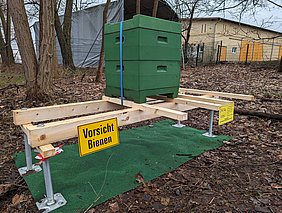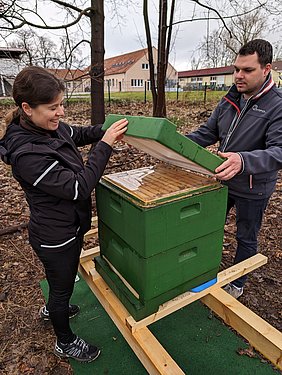ATB gets 60,000 helpers
Probably the best-known pollinators have found a home at ATB. Just in time for their "awakening", dedicated ATB researcher Saskia Strutzke settled a hive currently containing around 20,000 bees on the ATB site. This number will grow to around 60,000 bees over the next few weeks.
Saskia Strutzke is passionate about animal welfare. While she conducts research into the non-invasive measurement of stress in dairy cows and young horses and sells innovative health trackers for cattle through Gouna GmbH, which she founded, she is involved in the East Berlin Beekeepers' Network in her spare time. Last year, she came across the bee colony, which was also crossed with wild and northern bees and which grew well at home and overwintered successfully. Last Thursday, she moved her bees to ATB, where the colony can continue to grow.
ATB in Potsdam-Bornim offers great conditions for bees. Within a radius of 5 kilometres, which corresponds roughly to their collection radius, the bees can find large orchards in the Lenné fields alongside agricultural fields. The large short rotation coppice, on which ATB plants robinia trees, among others, for long-term experiments and the institute's heat supply, as well as the flowering meadows on the campus and the newly planted trees also provide the animals with sufficient food. The honey yield could be around 40 to 60kg per year.
The hive was set up hidden behind "CIRCLE", an ATB building opened in 2019, which is equipped with state-of-the-art microbiology laboratories, event rooms and numerous offices. Even though the peaceful insects have their peace and quiet there, they do require some care. From cherry blossom onwards, Mrs Strutzke and her beekeeper colleague Daniel Fiske will look after the hive about once a week. In order to regulate the size of the colony and reduce mite infestation, they have to regularly remove drone eggs. It is also important to identify offshoots if the colony has grown too much so that they do not move out on their own and form new colonies. The offshoots should move into two other hives next door.
The ATB board believes that two more strains could find a home on ATB site in Bornim. Saskia Strutzke is working towards this and hopes that the bees can also be integrated into ATB research in the future, as a high pollinator performance can enormously increase the yield quantity and quality of surrounding fields.
"I am very happy about the uncomplicated accommodation of the hive at ATB and am excited to see how the colony will develop this year, especially the possibility of expanding our colony was very important for us" says Saskia Strutzke. "The importance of bees for our ecosystem is often forgotten and we hope that our enthusiasm for hobby beekeeping is contagious. Anyone who doesn't beekeep themselves but would still like to make a contribution to our ecosystem is welcome to contact us. We are also happy to answer questions about the little "jack-of-all-trades"."
Contact
Saskia Strutzke
e-mail: sstrutzke@atb-potsdam.de


